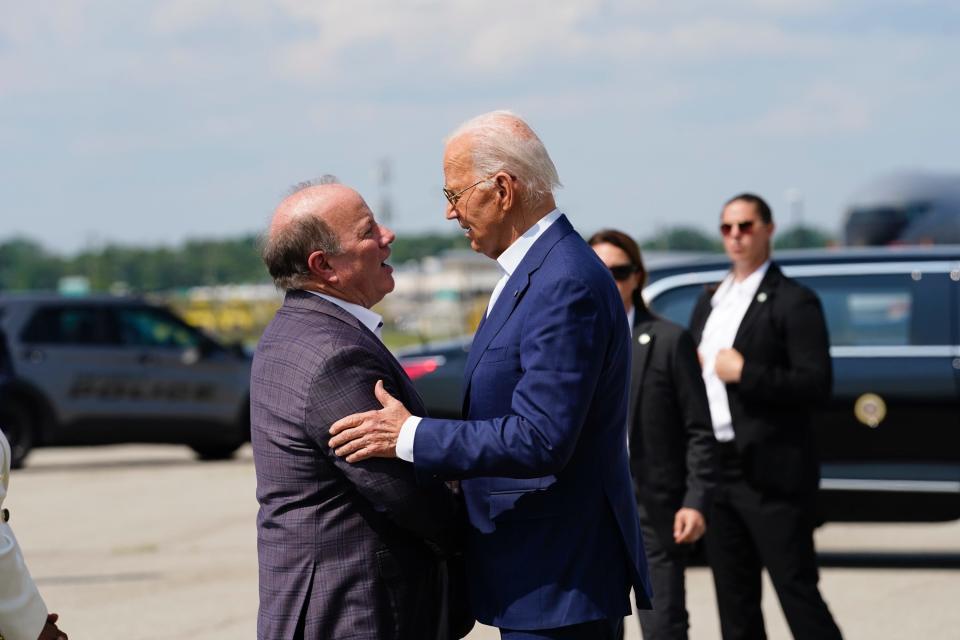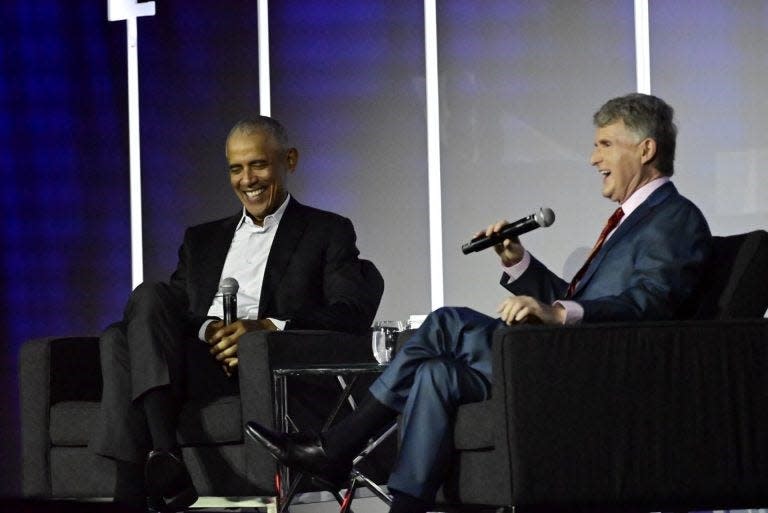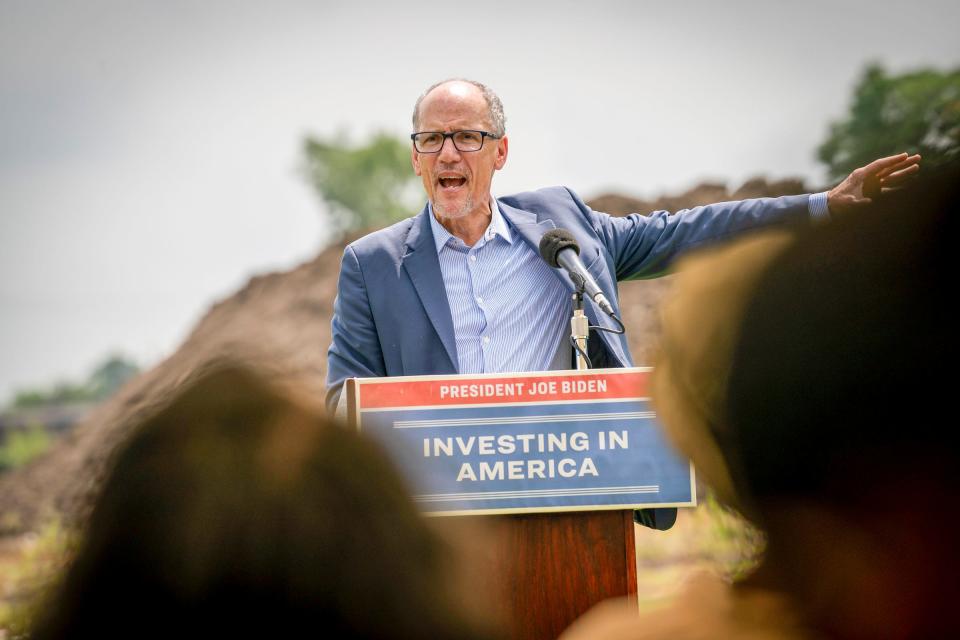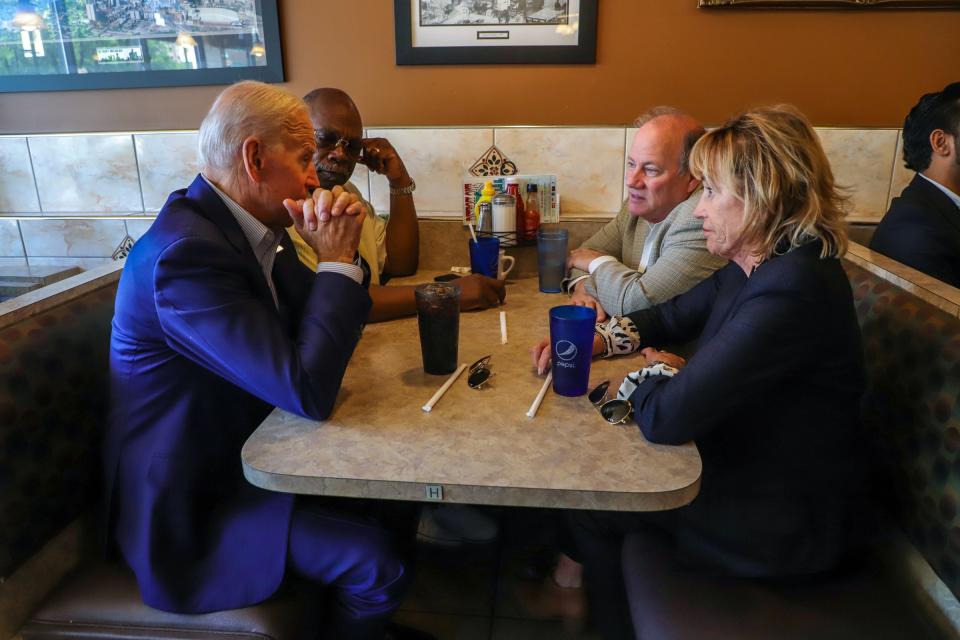Duggan's strong rapport with Biden White House will end: What Detroit must do next
Shortly after President Joe Biden dropped out of the 2024 race and immediately boosted Vice President Kamala Harris, Detroit Mayor Mike Duggan endorsed her. Duggan, known for pulling in federal resources and his strong rapport with Biden, has yet to declare whether he will seek another term to manage a challenged city or hand the task over to a new leader.
Duggan and Biden’s tight alliance benefited each other’s policy portfolios in numerous ways. Duggan was able to acquire new amenities, such as buses, and snatch nearly $1 billion in federal money; Biden got help with voter turnout, his push for electric vehicle infrastructure and maintaining former President Barack Obama's commitment to the city.
After Biden dropped out of the race and without certainty about Duggan’s political future, despite widespread belief that he’s considering a gubernatorial run, city leaders and residents are left to wonder about Detroit's relationship with the White House after Biden.
Duggan has said that if Harris, the Democratic nominee vying for the presidency, secures Biden’s seat, then the city will be in good hands because of her shared commitment with the president toward recovering Detroit’s post-bankruptcy losses.

"The Biden-Harris team has brought Detroit's recovery back 10 years ahead of time," Duggan previously told the Free Press. “She’s totally on top of the issues I’ve managed. She's advocated for the issues for the city of Detroit and she's a good friend. I've met with her numerous times in Washington, D.C. In fact, it seems like any time I'm there, she makes it a point to want to talk about what's going on.”
Trump didn't visit, mostly ignored Detroit
During former President Donald Trump’s term, Duggan recently said, the two did not have a good relationship, nor did the president visit the city. Rip Rapson, president and chief executive officer of Kresge Foundation — which invests millions into the city annually — said that the Trump administration essentially ignored Detroit and provided “nothing comparable” to what the city experienced during the Obama years.
Should Trump win, local communities and organizations will have to mobilize, he said. Rapson praised Duggan and said the city would need a mayor of his "caliber" to continue to find ways to boost disadvantaged areas.
“I know he has his critics, and I know he can be difficult in any number of ways, but every time you flip to the other side of the ledger, there's just all of these positives about what he has done, and what he has done in a way that many others couldn't have done,” Rapson said.
Detroit mayor must be 'cheerleader in chief'
Rapson was involved in numerous meetings with politicians, staffers, billionaire investors and, primarily, former President Obama’s Cabinet in an effort to prioritize investments in key areas of the city. Detroit has a history of partnering with philanthropic organizations to fund city services, including public greenways, the M-1 Rail streetcar system, and other whopping investments in neighborhoods.
Although a personal relationship between the mayor and president can benefit the city, the next mayor will need to do more to make strides in supplying financial resources for Detroit, Rapson said.
“You’ve got to have a mayor at the center of these things that helps set priorities, that helps create a sense of legitimacy for the community about how we’re spending dollars, that pulls people together in common purpose, all the things mayors have to do, and who has to kind of be the cheerleader in chief,” Rapson said. “You just have to hope those things will be true for the next mayor.”
Current prospects who have filed candidate committees for the mayoral seat lack Duggan's links to the White House. Those potential candidates include Detroit City Council President Mary Sheffield and ex-businessman Joel Haashiim.
A former Duggan cabinet official familiar with the inner workings of the mayor’s relationship to federal partners, who watched him navigate Obama’s presidency, pointed out that their strong tie was partially due to the broadcasting power Detroit held among Black and Arab American voters.
The former administration official shared sentiments similar to Rapson's — that the mayor, if Duggan leaves office, must be attentive in cultivating reform and progress.
Obama's commitment to 'such an iconic city'
“I think the next mayor is going to have the challenge of what their relationship to the prior mayor’s leadership was, because it’s hard to follow somebody like that, politically. I think a lot of attention needs to be paid to the appointments and who and how the next generation of leadership interacts. Those relationships can be important,” the official said.
Rapson recalled, years back, when his phone rang from Obama’s domestic policy team. An official told him, “I just got out of a Cabinet meeting with President Obama and the other Cabinet members, and the president pounded the table and said, ‘I will not permit Detroit to become the Katrina on my watch.’ And over the next couple of years, they dispatched people here.”

He asked multiple Obama aides why they were adamant about investing in Detroit’s resurgence, in which they replied, "Because this is such an iconic city," Rapson said,
"I said, ‘Yeah, but you know, there are lots of iconic cities.’ Basically, I think they thought that there was something so powerfully symbolic about the rise and the fall, and the potential rise again of Detroit that they just couldn't ignore it,” Rapson said.
Current White House adviser Tom Perez, who was recently in the city boosting the Joe Louis Greenway alongside Duggan, told the Free Press the city “embodies the spirit of America,” and pointed to an executive order pushing equity in underserved communities.
“We understand all too many communities of color have been left out, and that was a big reason why the president issued his executive order on equity, Day One. Mayor Duggan and others have really gone to school on that,” Perez said.
Connecting White House with philanthropy to boost Detroit
From then on, Rapson was among the voices of the philanthropic community relaying Detroit’s needs to federal partners, particularly after devising a “white paper” report, which Gene Sperling, economic adviser to the Obama and Biden administrations, circulated and established task forces around the categories Kresge created, he said. Rapson also created a conceptual drawing dubbed “Reimagining Detroit” of nine investable areas from 2008 to 2013, ranging from transit, to education, arts, land use and corridor redevelopment, which Cabinet members, including then-Vice President Biden, discussed.
He went to Washington, walked into a conference room in the White House and saw nearly every Cabinet member, several officials from the public and private sectors, including billionaire investors and discussed ways to make federal money available for demolitions, blight removal, the light rail and more.
“My favorite story in that meeting was at the very end, the guy who ran IT for the White House, very quiet guy, and he spoke up and said, ‘You know, I don't have any money. I don't have a grant budget the way these other guys do, but what I can do is pull together the top IT people … we could spend two days working in Detroit to try to figure out how to get your IT system into the next generation.’ Because at that point, we were still working off note cards,” Rapson said. “They just jumped right over into sort of next-generation IT work and Detroit developed one of the most sophisticated municipal IT practices in the country.”

Sperling pushed Rapson to put forth more commitments from local philanthropy and urge the other organizations to contribute to show the federal government is not the only one supplying the city’s needs. Eventually, financial commitments grew. Perez was part of the Detroit subcabinets in the Obama administration.
“One thing I learned about Detroit a long time ago is there's a rich history of philanthropy here,” Perez told the Free Press. “The hardest part about this is getting it going, because there's always … that initial getting off the ground, because you have to overcome skepticism.”
Detroit’s previous mayors held ties to the White House, but in the post-bankruptcy era, “you had a lot of people who knew the work and knew the history, and knew what the Obama folks had done to try to be helpful to stabilize Detroit, including the vice president, who became president,” Rapson added.
“This was an administration that has a long and deep sense of Detroit as an iconic city,” Rapson said. “When Mayor Duggan was able to forge that personal working relationship with Biden, it didn’t come out of nowhere. This is not just because the two of them are buddies.”

Detroit has an “unusual ecology” of the public and private sectors and the philanthropic sector working together.
“It has gotten into the federal water system that something really unusual is happening in Detroit. When you combine that with its iconic quality, and the sort of notion that we're not going to let Detroit fail because it's such an important city, and then you combine that with the sense that it is a well-run city, and that Duggan knows exactly what he's doing … I think this administration, whether it's led by President Biden … or Vice President Harris, is going to continue its commitment to the city,” Rapson said.
Dana Afana is the Detroit city hall reporter for the Free Press. Contact: [email protected]. Follow her: @DanaAfana.
This article originally appeared on Detroit Free Press: Duggan's rapport with Biden White House will end: What Detroit must do
Solve the daily Crossword

